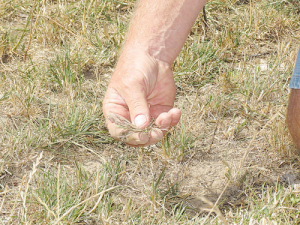Hawke’s Bay sheep and beef farmers warned to monitor stock water wells
Sheep and beef farmers in Hawke's Bay are being urged to keep a close eye on the wells that supply water to their stock.
 The drought has already taken its toll on farms and will take time to recover from, says Ag Minister Damien O’Connor.
The drought has already taken its toll on farms and will take time to recover from, says Ag Minister Damien O’Connor.
All Southland plus Otago’s Queenstown Lakes, Central Otago and Clutha districts are now declared officially in drought.
Agriculture Minister Damien O’Connor announced the extension of the “medium-scale adverse event” classification on January 30.
It means the southern provinces now join Taranaki, western parts of Manawatu-Whanganui and Wellington, and the Grey and Buller districts of the West Coast, where drought was declared over the Christmas period.
The declaration triggers extra funding of up to $130,000 for the local rural support trusts and industry groups to coordinate recovery support.
“We’ve been working with local farming groups, councils and NIWA to monitor how the drought has been progressing and the impact on the farming communities,” said O’Connor.
“Anticipated rain that could have provided respite hasn’t fallen in the right areas to mitigate the effects of the early hot dry summer. Farmers have been unable to grow sufficient feed for winter, and have been using stored feed and buying in supplements for stock, and selling animals.”
Bernadette Hunt, Southland Federated Farmers meat and fibre chair and drought spokeswoman, says the declaration is recognition that the situation is serious, and it mobilised a lot of support.
“The Rural Support Trust gets extra funding to roll out support for farmers. That can be one-on-one support for people who need it, it can be events, it can be provision of technical information through workshops.”
Hunt says stock water provision is the biggest priority for farmers.
“A lot of stock water schemes aren’t keeping up. Some people’s bores are running dry so the biggest priority for farmers is keeping water up for stock, and the second biggest priority is feed. A lot of people are using their winter feed supply to feed the stock now.”
Hunt says farmers are also looking closely at stocking levels. Lambs are being sold off at lighter weights than normal. Dairy farmers are bringing scanning forward to make early decisions on culling the empties, while many have gone to 16-hour or once-a-day milking.
“It’s across the whole rural sector but it’s also across urban. All of the towns are under severe water restrictions,” she said.
Federated Farmers Otago chair, Phill Hunt, says while many farmers are coping reasonably well with the drought, there is stress everywhere in Otago and some individuals are not coping “as well as they might”. “They’re the people we need to get to.”
“The Rural Support Trust, Beef + Lamb NZ, DairyNZ, Farmers Mutual Group, some of the processing groups, Fonterra and Silver Fern Farms, Clutha Vets -- we’re all involved in putting on functions to help farmers get through this stressful time,” Hunt says.
The drought declaration ironically came as both regions were preparing for heavy rain and possible flooding from former tropical cyclone Fehi, due to hit the South Island as Rural News went to press.
But baked-hard soil will not have the capacity to absorb the rain, increasing the likelihood of runoff and flooding, rather than soaking in.
Bernadette Hunt said the rain might bring temporary greening, but it would do nothing to lift aquifer levels.
O’Connor says the drought has already taken its toll on farms and will take time to recover from.
“While rain now would allow pasture to grow, this can take a month to translate into feed for animals, and many are now well behind in preparing for winter.
“So the recovery assistance measures are as important as ever, even when we finally get decent rain.”
Stock kill could dry up
Meanwhile, the Alliance meat company said processing at its Lorneville and Mataura plants is continuing as normal so far, but it is monitoring the situation.
“We have been running plants at optimum capacity to process farmers’ livestock. However, the continuing high temperatures and dry weather are now limiting our ability at Lorneville to discharge treated wastewater to the Makarewa River, in accordance with our resource consent conditions,” company secretary Danny Hailes says.
“We have obtained temporary consents from Environment Southland to allow additional irrigation of treated wastewater onto land we own.
“We have also been working to minimise water use at Lorneville and Mataura for the past few weeks.”
Bernadette Hunt says if processing capacity were affected it would mean farmers were stuck with stock for longer than they could feed them.
Coming in at a year-end total at 3088 units, a rise of around 10% over the 2806 total for 2024, the signs are that the New Zealand farm machinery industry is turning the corner after a difficult couple of years.
New Zealand's animal health industry has a new tool addressing a long-standing sustainability issue.
The Government has announced that ACC will be a sponsor of this year's FMG Young Farmer of the Year competition.
As veterinary student numbers grow to help address New Zealand's national workforce shortge, Massey University's School of Veterinary Science is inviting more veterinary practices to partner in training the next generation of vets.
South Island dairy farmers will soon be able to supply organic milk to Fonterra.
Norwood has announced the opening of a new Tasman dealership at Richmond near Nelson next month.

OPINION: Meanwhile, red blooded Northland politician Matua Shane Jones has provided one of the most telling quotes of the year…
OPINION: This old mutt has been around for a few years now and it seems these ‘once in 100-year’ weather…